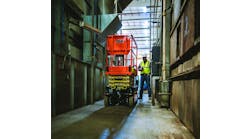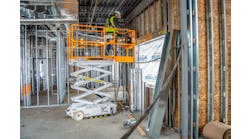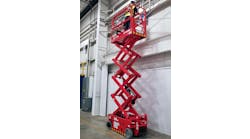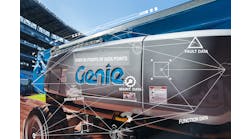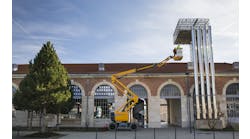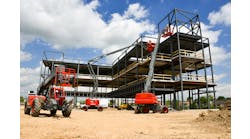RER recently sat down with Snorkel's candid new president of North American operations David Smith who talks about the reliability of the supply chain, the strengths of a smaller manufacturer, what he expects in 2011 and how rental rates will influence the industry's recovery.
RER: David, first give us an idea about who you are, and your background in the industry?
Smith: I've been with Snorkel a little over six years, all with the plant here in St. Joseph, Mo./Elwood, Kan. I started as director of materials, so I came in to run our supply chain, and planning and scheduling functions. About two years after that, I transferred to product support and became director of product support over parts and tech service training and field service responsibilities.
As the downturn started in 2008, I basically ended up doing both supply chain and product support, and then in late 2008, I was promoted to vice president of operations, and did that job until this past October when I was promoted to president of North America. That's my history in the lift industry. Prior to coming to Snorkel I worked mostly in plastics, geared towards construction equipment like John Deere and Caterpillar and those type companies, and then I spent about a year and a half working for a tier-one supplier to GM and Ford.
What are your first observations after taking over at Snorkel?
I think we're starting to see a little bit of loosening up of rental rates and therefore the general feel of our customer base is they will need some equipment next year. Some of them are doing some pre-ordering to get ahead of any availability issues that might happen next year, simply because they need to stay on their replacement fleet cycle. Most have a wait-and-see attitude; they think they are going to need equipment but they don't know exactly what models. They are concerned about what rental rates are going to do and what the general economy is going to do.
I don't know how many times over the last six weeks I've heard, “depending on what happens with the government and the tax cuts.” There is still a lack of confidence with the rental markets that this thing is really coming out of the downturn and what level that will be. Therefore do they go and buy used because rental rates are somewhat low or are the rental rates going to come up to where they can make a new equipment purchase work in their ROI model?
It's hard to get those rates up even when the economy gets better.
You're absolutely right, it's easy to take them down but it's hard to get them up. And even though most of our customers have had up until the last month probably because of the way the weather is turning, most customers have had improved utilization rates. Part of that is because they have de-fleeted and part of it is because there has been some activity and some construction starting, but I think the reality is there is still a huge abundance of supply out there with most models. Until that rights itself, either with increased demand or more de-fleeting out of the country, those rental rates just logically can't come up.
Do you think that will take a while?
They've seen some improvements in most parts of the country; obviously the Southeast is still pretty significantly depressed, The Southwest has been so low that they are starting to see a bit of improvement. The Midwest, like all things in the Midwest, doesn't drastically increase and doesn't drastically decrease the same amounts that the coasts do. It's the housing market and everything. We don't see the same dramatic swings in the Midwest, but they still have some room to come up, for sure.
You have a challenge trying to compete with bigger players such as JLG and Genie, can you tell me about that?
Obviously we're a tremendously smaller company than JLG or Genie but we think that the disadvantages of that are outweighed by the advantages, that we can stay flexible. And quite honestly we gained a lot of market share as we came out of the last recession, after 9/11, simply because we had a good product at a competitive price and we had availability. So is that going to happen again? I don't think we're going to see the dramatic increase in demand like we saw in that swing. But right now the flavor to me is very similar to the way it was in 2004. It's a ConExpo year and a lot of people are kicking tires, and not really looking at a lot of fleet planning until after ConExpo.
On the other hand, if things pick up in January, February, which is unforeseen at this point, they're not going to have a choice but to start getting some stuff on order before ConExpo.
We're smaller, but we have a niche. Do we want to be, at some point, as big as them? Maybe, but at this point we think there is still a significant demand and market out there for somebody like Snorkel that has a simplistic view of design, machines that are easy to troubleshoot. Rental companies don't have the highly technical experienced mechanics that they once had, those people have moved on, and they need somebody that can troubleshoot a machine with a simple wiring diagram and a voltmeter. And you can basically still do that with a Snorkel.
What are your strengths as a company?
We still have that easy-to-do-business-with flexibility and agility, our customers are appreciative of the personal touches that we have. Our equipment is simple; we can cater to some of their option needs on equipment maybe a little bit better. We are agile and flexible and can increase our capacity to meet the market demands. That's essentially what we're trying to do right now, increase our capacity to make sure we have the availability for those customers that don't have the resources to give us a bunch of visibility. Our biggest issue is about supply chain, we need to be and are managing our supply chain for giving them visibility so they can go get the raw materials they need and hire the people that they need to build the products that we need.
How does the supply chain look to you now as far as the availability of raw materials and components?
It's not where we want it to be, there's definitely some hard work that needs to be done there. Everybody has a reactive mentality right now because of the pain they've been through the last two years, but when we go to them and say we are ready to place orders for X amount of whatever parts base that particular supplier supplies to us because we have these customers and these orders that are in place, they go build it. Their lead times are longer than they used to be. But there's plenty of manpower out there for people to start growing their capacity again. So it takes some planning and some forethought and some management to get them to where we need to be, but they are all very capable and they see it coming. They're just kind of playing a reactionary game instead of a pro-active one where you go hire the people and ‘if they build it they will come.’
Is one of the advantages of a smaller company that it's perhaps a bit easier to call up and get the president of the company on the phone?
Yes, and what I've been doing over the past eight weeks, is getting out there to see our customers and make sure they know that there is somebody in charge and that they can call on me if they have issues and I'm really trying to gain those relationships in the country, in the continent really, that we have strengths and we have a plan and they can trust that we're going to protect the assets that they buy.
Any particular plans for the Elwood facility and Fresno, the old Upright facility?
Fresno is remaining as another layer of Snorkel product support, we get two hours extra of support there for the East and Central parts of the country by having them open. They have some strategic stock. And they are also doing quite a bit of R&D work there, some engineering design and development of products. As well as refurbishment and rebuilds. If you get below a 60-foot machine, the ROI to freight them to Kansas starts getting kind of sideways. Anybody in the West region of the country, we can freight those machines into Fresno quite a bit less expensive and still make that refurb or rebuild work out for us. So that's the Fresno facility.
And then in the Elwood facility, our plans are to continue to manufacture the complete line of Snorkel products. We're actually adding some of the products that were initially UpRight products; we've now designed those and those are now into the Snorkel product range and those will be manufactured here. So we're in the process of retooling some of our lines to make sure we can handle those that are quite a bit different from the existing products. We're training our workforce to do so, and at this point we're bringing people back and hiring new people in every area of the company to support the capacity increase and growth that we're seeing coming.
Are you concentrating more on the low-level access area, is that your focus?
We're not shifting our focus from one to the other. Snorkel has always been an electric scissor and small-to-medium size boom company, and that's what Snorkel's been known for. What we want to do is continue to focus on those products because they are our core products, and those are what our customers know us for, but we also want to have additional focus on the lower-level access because that's a product that Snorkel hasn't had and UpRight was very well known for. And secondly it's a product that's up and coming. There's becoming more and more regulations on ladders and stair-type ladders, and where we're seeing a huge demand [for low-level access] products in Europe, it's inevitable that it's coming our way and we want to be on the forefront of that with our customers and some customers that maybe we don't do business with today that are going to be in need of those types of products.
It's an additional focus. I don't want to say our focus is still not on the core products that Snorkel is well known for; we just have an additional product line that we now focus on as well.
Is the rental industry your biggest market here in North America?
Yes. It is definitely mostly through rental. Low-level access has given us an opportunity to diversify ourselves into some other industrial-type accounts that we didn't have the products to infiltrate before. So that's really that additional focus. A [typical general] rental company is not necessarily the customer that's going to be looking for a 10-foot Pop-Up machine for their construction rental fleet. Those rental companies in a lot of cases really out of necessity over the last two years have started departments and really started to focus on the retail side of things. And in doing so, they have found a new avenue for revenue in that low-level access and they are coming to us asking for those products, as well as going out and trying to find some of those direct big industrial construction type companies that like to buy that stuff. So yes our customer base right now is absolutely your RER 100, that's our focus, but we see the additional focus that we have with the low-level access becoming more of a piece of our business in those industrial markets.
In terms of the Snorkel/UpRight brands, is it going to be predominantly all Snorkel now?
At Bauma in Germany in April, we introduced a new logo, and a new color scheme for all machines both UpRight and Snorkel. The logo is Snorkel, so globally we are now Snorkel with the new logo. Our color scheme is now global; it's orange, white and black — very similar to the previous Snorkel color scheme. The UpRight products still exist but we have integrated all those into a complete Snorkel line for all customers globally. But then we have the Pop Up name that will remain as the push-around and mini-scissor drive brand that will keep that Pop Up brand, because it's very well known in Europe. And we're marketing that and promoting that very hard in the U.S. as a brand for that small pop-up.
Do you feel the economy will be a steady slow improvement?
Yes. I don't feel we'll have a double-dip, I don't see that. I think it's going to be steady. The fleets are so aged, there's some pent-up buying demand, not necessarily demand on the end customers. The thing that is so contingent on everything else in our industry is what happens to those rental rates. Obviously that's what drives all of us.

